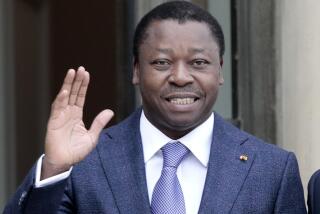Indonesian Democracy Leaps Forward
- Share via
JAKARTA, Indonesia — In a major expansion of democracy, Indonesia’s top legislature amended the constitution Saturday to allow direct presidential elections and end reserved seats in parliament for military officials.
Closing out its annual two-week session, the 700-member People’s Consultative Assembly also rejected calls to impose Islamic law in the nation with the world’s largest Muslim population.
The assembly’s decision to abolish its own role as an electoral college that picks the head of state is considered the most important government change since the 1960s, when Indonesia was shaken by political unrest.
When the assembly’s speaker, Amien Rais, asked the delegates to agree on a direct presidential ballot beginning with the 2004 election, they chorused: “Agreed.”
All the measures endorsed Saturday were adopted by consensus rather than open ballot, after party leaders agreed that no faction should be publicly seen to be defeated.
Since Dutch colonial rule ended after World War II, the assembly has elected the president for five-year terms. But legislators and democracy groups have been pressing since 1998 for a direct vote of the people in this nation of 228 million.
Just after the assembly decided on the election issue, police sprayed a water cannon on an estimated 500 students who were protesting at the gates of parliament. It was unclear whether the students--who largely support a direct presidential vote--were aware of the decision to allow direct elections.
The students later dispersed.
Indonesia has a strong presidency, making Cabinet ministers responsible to the president rather than parliament and giving the president wide powers, including the right to regulate a wide range of matters by decree.
Gen. Suharto, who took the reins of power from Indonesia’s founding father, Sukarno, in 1966, abused the system by rigging six consecutive presidential ballots starting in the early 1970s. He was ousted in 1998 after widespread street protests.
The constitutional amendment adopted Saturday sets up a two-stage election for president, with a runoff required if no candidate wins a majority in the first round.
President Megawati Sukarnoputri, daughter of Sukarno, is widely expected to seek and win reelection.
Legislators also reached consensus on speeding up the abolition of 38 parliament seats reserved under Suharto for the security forces. The seats will be eliminated in 2004 rather than 2009 as previously planned.
Hard-liners among the traditionally dominant army leadership opposed the move, but reformers in the air force, navy and police supported it.
“This means that the military and police will be concentrating more on professionalism,” said Adm. Franky Kaihatu, a military legislator.
Two Muslim parties dropped their proposal for the adoption of Islamic law. The idea faced strong opposition from secular parties as well as the country’s largest religious organizations.
“We agreed that the article on the freedom of religion will remain unchanged in the 1945 constitution,” said Jusuf Muhammad, a leader of the National Awakening Party, a moderate Muslim party that advocates keeping Indonesia a secular state.
The development was expected. A proposal to introduce Islamic law has been on the agenda of every assembly session since Suharto’s overthrow, but it has never attracted significant support.
More than 85% of Indonesians are Muslim, but the majority support a secular government.
More to Read
Sign up for Essential California
The most important California stories and recommendations in your inbox every morning.
You may occasionally receive promotional content from the Los Angeles Times.









